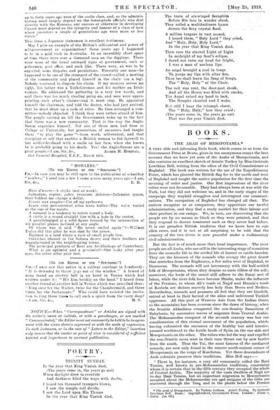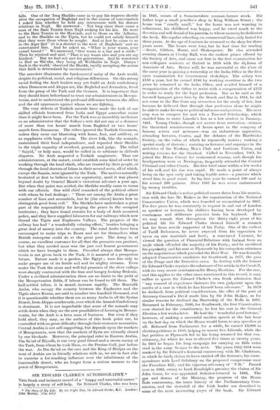BOOKS.
THE ARAB OF MESOPOTAMIA.*
A VERY able and informing little book, which comes to us from the Government Press at Beare, gives in ten anonymous essays the best account that we have yet seen of the Arabs of Mesopotamia, and also contains an excellent sketch of Asiatic Turkey by Miss Gertrude Lowthian Bell, writing from the office of the Civil Commissioner at Baghdad. The book was written for the use of the Expeditionary Force, which has planted the British flag far to the north and west of Baghdad and taught the native population for the first time the meaning of order and justice. Our first impressions of the river tribes were not favourable. They had always been at war with the Turk, but they did not welcome us, and in the early stages of the campaign they waylaid stragglers and interrupted our communi- cations. The occupation of Baghdad has changed all that. The natives recognize us as conquerors, they apprdciate our tactful administration, and they fmd a ready market for their labour and their produce in our camps. We, in turn, are discovering that the people are by no means so black as they were painted, and that they respond to decent treatment such as they never had before. It is our proudest British tradition that we know how to rule alien races, and it is not at all surprising to be told that the country of the two rivers is now peaceful under a rudimentary civil administration.
But the fact is of much more than local importance. The river people are all Arabs, who are still in the interesting stage of transition from the nomadic life to the settled life of farmer or cattle-breeder. They are the kinsmen of' the nomads who occupy the great desert that stretches from the Euphrates, a few miles west of Baghdad, to Damascus. The nomads will not intermarry with the half-settled folk of Mesopotamia, whom they despise as mere tillers of the soil ; moreover, the lords of the camel still adhere to the Sunni sect of Islam, while the river folk have become Shiahs, under the influence of the Persians, to whom All's tomb at Najaf and Husain's tomb at Kerbela are shrines scarcely less holy than Mecca and Medina.. Nevertheless, nomads and peasants all feel that they are kinsfolk, united at least in their hatred of the alien and unlettered Turkish oppressor. All this part of Western Asia from the Indian Ocean to the mountains has been overrun since the dawn of history, when the Semitic Akkadians conquered the non-Semitic Sumerians of Babylonia, by successive waves of migrants from'central Arabia,. The Mohammedan conquest of the seventh century was but one manifestation of this eternal movement of the population, which, having exhausted the resources of the healthy but- arid interior, pressed northward to the fertile lands of Syria on the one side and Mesopotamia on the other. The tribes who led the way and expelled the non-Semitic races were in their turn thrust out by new hordes from the south. Thus the Tai, the most famous of the mediaeval nomads, are now only found in the remote north-eastern corner of Mesopotamia on the verge of Kurdistan. Yet these descendants of Arab colonists preserve their traditions. Miss Bell says
There is, for instance, a very old community called the Beni Taanim, well known in pre-Mohammedan traditions, concerning whom it is certain that in the fifth century they occupied the whole of Central Arabia. The majority of the oasis dwellers of Najd are to-day Banff Tamim, but an important migration to Mesopotamia occurred about the Mohammedan era and sections of the tribe are scattered through the 'Iraq and in the plat/fa below the Persian
• The drab of mesopotataia. By Various Authors. Asiatic Turkey. By Gertrude Louthisn Bell. Basra : Superintendent, Government Press. London : Times 0, India. De, Cd.1 hills. One of the 'Iraq Shaikhs came in to pay his respects shortly after the occupation of Baghdad and in the course of conversation I asked him whether he held' any intercourse with his distant relations in Najd. He answered : Not long since there came a. man of the Bani Tamim from Najd seeking for his kin. He went to the Bani Tamim in the Hawizah, and to those on the 'Adhaim, and to the Shaikhs on the Tigris, but he could not satisfy himself that they were those whom he sought. And at last he came to us in the Agar Quf ' (it is a district to the west of Baghdad) and we entertained him. And he asked us, "What is your wasm, your camel brand ? " We answered, " Our wasm is a bar and a circle." Then he rejoiced and said, "That is my warm also and you are my kindred." But we had not met for generations. And he wondered to find us Shrills, they being all Wahhabis in Najd. Durdys. ! Such is the world,' observed the Shaikh, tacitly accepting the axiom that faith is determined by environment."
The anecdote illustrates the fundamental unity of the Arab world, despite its political, social, and religious differences. On this strong racial feeling the Arab leaders may yet build an Arab confederacy when Damascus and Aleppo are, like Baghdad and Jerusalem, freed from the grasp of the Turk and the German. It is important that they should learn beforehand to trust our administrators in Mesopo- tamia, and to understand the profound difference between the Allies and the old oppressors against whom we are fighting.
The very defects of Turkish misrule have made the task of our skilled officials borrowed from India and Egypt somewhat easier than it might have been. For the Turk was so incredibly inefficient as an administrator that the Sultan's writ did not run at a distance of more than ten hours' march from Baghdad or two hours' march from Damascus. The tribes ignored the Turkish Governors, unless they came out blustering with horse, foot, and artillery, or as suppliants with bags of coin. The river folk, like the nomads, maintained their local independence, and regarded their Sheikhs in the triple capacity of overlord, general, and judge. The tribal " Saiyid," or holy man, would be called in to arbitrate in difficult disputes. No Arab respected a Turkish magistrate. Thus our administrators, at the outset, could establish some kind of order by working through the local chiefs, who are trusted by their people, or through the local doctors of Islam in their several sects, all of which, except the Sunnis, were ignored by the Turk. The natives naturally hesitated at first to believe in our superiority, until it was placed beyond doubt by General Maude's victorious advance a year ago. But when that point was settled, the Sheikhs readily came to terms with our officials. One wild chief remarked of the political officer with whom he had dealings : " There are among the Arabs a great number of liars and scoundrels, but he [the officer] knows how to distinguish good from evil." The Sheikhs have undertaken a great part of the responsibility for keeping the peace in the occupied territories ; they have found recruits for a body of Arab mounted police, and they have supplied labourers for our railways which now thread the Tigris and Euphrates Valleys. The progress of the railway has had " a wonderfully calming effect," besides bringing a great deal of money into the country. The rural Arabs have been
encouraged to make trips to Basra and see for themselves what British enterprise could do at the great port. The Army is, of course, an excellent customer for all that the peasants can produce, but what they needed most was the just and honest government which we have brought to them. Provided always that Mesopo- tamia is not given back to the Turk, it is assured of a prosperous future. Nature made it a garden, like Egypt ; man has only to make proper use of its fertile soil and its mighty streams. Even
under the Turk the stout and well-fad peasants of the river valleys were sharply contrasted with the lean and hungry-looking Bedouin.
Under a civilized administration there are no limits to the yield of the Mesopotamian fields, if labour can be found to till them. The half-settled tribes, it is stated, increase rapidly. The Muntafik Arabs, who occupy the country between the Euphrates and the Tigris above Kurna, are said to number two hundred thousand, and it is questionable whether there are as many Arabs in all the Syrian Desert, from Aleppo southwards, over which the Anazah Confederacy is dominant. It is not improbable that some of the nomads may settle down when they see the new possibilities of farming in Mesopo- tamia, for the Arab is a keen man of business. But even if they hold aloof, they may, as the authors of this book point out, be controlled with no great difficulty through their economic necessities.
Central Arabia is not self-supporting, but depends upon the markets of Mesopotamia, now that the markets of Syria are virtually closed by our blockade. Moreover, the principal ruler in Eastern Arabia, lbn Sa'ud of Riyadh, is our very good friend and a sworn enemy of the Turk, from whom he took Hasa, on the Persian Gulf, just before the war. As Ibn Sa'ud on the east and the King of Hedjaz on the west of Arabia are in friendly relations with us, we are in fact able to exercise a far-reaching influence over the inhabitants of the inaccessible desert, who no longer form a serious menace to the peace of Mesopotamia.



























 Previous page
Previous page